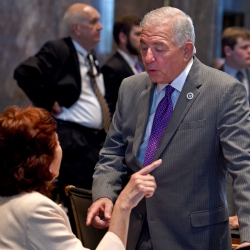
Louisiana State Sen. Ronnie Johns (R-Lake Charles) discusses legislation with State Sen. Beth Mizell (R-Franklinton).
State Sen. Ronnie Johns expects Louisiana to pass new gaming laws during the 2018 legislation session. Rep. John said, besides a 2001 law which loosened some restrictions on riverboat casinos, Louisiana has not passed new gambling legislation.
An update of the riverboat gambling laws are the changes state lawmakers are likeliest to make. Ronnie Johns wants to remove restrictions that limit riverboat operators to 30,000 square feet or less, while allowing riverboat casino owners to move their operations onland.
If those changes are instituted, the commercial casino operators will be able to compete with tribal casinos on a more equal footing. Under terms of the 1988 Indian Gaming Act, Native American tribes are not regulated in the same way that commercial casinos are.
Louisiana Gaming Revenues
Despite those conditions, Louisiana’s casino revenues totaled $916 million in 2016. As a way of comparison, mineral revenues, considered a major revenue producer for the state for many years, topped only $581 million in 2016.
The idea is Louisiana casino revenues have been hamstrung by outdated laws, yet still outperform a number of the states major industries. In particular, the various casino operations in the Lake Charles area have become quite lucrative in the past several years.
Louisana Gaming Control Board Wants Updates
Ronnie Jones, Chairman of the Louisiana Gaming Control Board, said Louisiana’s gaming laws need to be looked at from an economic development standpoint. Tax revenues are one matter, but a more modern casino industry would create tens of thousands of jobs in Louisiana. Much of the revenue would come from out-of-state gamblers, because of Louisiana’s unique situation.
New Orleans draws a tremendous number of tourists each year, so New Orleans area casinos would generate more revenue from tourist gamblers. The nine casinos in the Lake Charles area draw visitors from Houston, which is about 2 and 1/2 hours drive away from Lake Charles.
The six casinos in the Shreveport-Bossier City area are a similar 2 and 1/2 hour to 3-hour drive from the Dallas-Fort Worth Metroplex, so much of the boosted gaming revenues would come from Texans — not Louisianans.
Riverboat Casinos Become Land-Based Facilities
Additional space would allow commercial casinos to install new slot machines, which often are bigger and showier than their predecessors. Of course, more gaming space would mean more gaming machines and table games.
The casinos also want an end to taxes on promotional money used to draw in customers. Promotional casino credit is a hot-button issue in some other states, because some states tax casino gift cards and others do not. Casinos give out tens of millions in casino credit each year as a promotional tool, and it has been proven to drive customers. Getting a tax break on that house money would be a boost of several million a year for the state’s casino industry, most likely.
Louisiana Sports Betting Laws
Another reason Louisiana riverboat casinos would like to move to land is the ability to host sportsbooks. At the moment, the fate of a federal ban on sports betting hangs in the balance, as New Jersey’s 5-year quest to oveturn the PAPSA law is being decided in the US Supreme Court. On December 4, New Jersey’s lawyers argued before the nine justices of the POTUS.
A decision on the sports betting question is expected sometime in the first half of 2018, perhaps as early as April. If the PASPA is struck down, Louisiana lawmakers want to have provisions in place to allow legalized sports betting in the state. Louisiana was one of 20 states to sign an amicus brief in support of New Jersey’s Supreme Court appeal of the sports betting laws. Other states, including nearby Mississippi, have passed laws to take advantage of unfettered sports betting, if it should happen.
